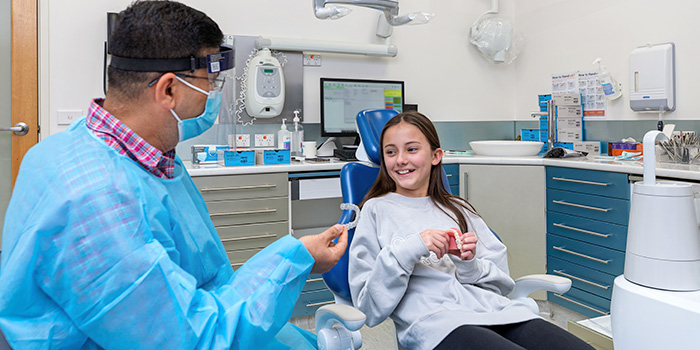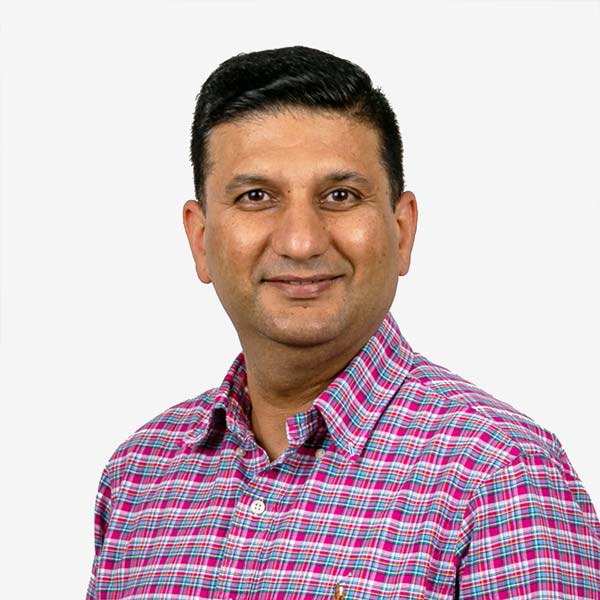Kilmore’s ONLY registered specialist Orthodontist
Dr. Gopal Kataria is pleased to offer specialist orthodontic treatment at Kilmore Dental & Specialist Centre. He is an AHPRA registered orthodontist meaning that he has undertaken postgraduate university specialist training on top of his general dental degree. He is the only specialist orthodontist that you will find practising in Kilmore! He has been with us since the establishment of the practice in 2009 and during that time he has created many wonderful smiles for our community. Specialist orthodontists limit their practice to only orthodontic treatment so that is all he does all day, every day. Only an orthodontist has been specifically trained and is the most qualified and experienced person to treat issues to do with the alignment of teeth and jaws to ensure you, or your child, ends up with a healthy and confident smile.
Your First Consultation
At your first consultation with our specialist orthodontist you will meet Dr. Gopal Kataria and discuss what you would like to achieve with your smile. Prior to this visit the practice will organise the radiographs that are required to make a thorough orthodontic assessment. These are bulk billed and claimed on Medicare. During this first visit Dr Kataria will conduct a thorough examination of the facial structure, the bite, alignment of the teeth, health of the soft tissues, and jaw function. Dr Kataria will also take a series of measurements, and discuss the potential need for orthodontic treatment. Digital photographs of your smile and bite will also be taken. With these records, Dr Kataria will be able to provide a detailed and accurate assessment, as well as a personalised treatment plan.
At a subsequent visit, Dr Kataria will discuss the ideal treatment plan, as well as any alternative options which are available. With the aid of computer software and the records taken at your last visit, Dr Kataria will thoroughly explain your bite problems and the treatment required to correct them. If it is too early for a child to start treatment, we will place them in our continuing care program. Your child will then be reviewed periodically, at no cost, until they are ready to commence treatment.
Read more about digital orthodontics – Invisalign and iTero scanner.
The benefits of orthodontic treatment
We all know orthodontic treatment leads to a straighter, more beautiful smile, but did you know the health and function of the teeth are also improved? Properly positioned teeth are much easier to clean, thereby making them less susceptible to tooth decay, gum disease, and even tooth loss. Correction of the bite can also improve chewing and speech, reduce the risk of trauma to the teeth and gums, and also plays an important role in minimising excessive and uneven wear of the teeth. There are also the positive impacts on confidence and self-esteem that flow through from orthodontic treatment.
Frequently asked questions
How long does orthodontic treatment take?
On average, orthodontic treatment usually takes 18 – 24 months and other more complex cases may take longer to complete. The total treatment time depends on a large number of factors which include the severity of the original bite problem, the type of treatment carried out, and the co-operation of the patient.
When will appointments be scheduled?
We share your concern about missing school or work, and we make every effort to ensure that all patients receive a fair share of convenient appointments. We schedule longer appointments during school hours and shorter appointments before and after school. By doing this, we do not reserve these popular appointment times for one or two patients but rather accommodate as many families as possible for out-of-school appointments.
Do Invisalign or braces hurt?
Modern techniques have certainly brought the look and comfort of orthodontic treatments a long way. However, Invisalign or braces do need to be regularly adjusted, and this will cause some discomfort and tenderness for a few days. During this short period, soft foods and a mild analgesic may be needed.
Should I continue to see my family dentist while I have Invisalign or braces?
Definitely! It is very important to continue your regular dental check-ups to prevent and detect dental decay and to monitor your overall dental health.
When is the best time to start orthodontic treatment?
Although an orthodontist can enhance a smile at any age, many orthodontic problems are easier to correct if treated prior to the completion of growth.
Early treatment may prevent the need for extraction of permanent teeth, surgery and other serious corrections later in life. However, due to the complex nature of orthodontics, early treatment may not be right for every child. Only after a clinical examination of your child can the proper treatment plan be determined.
Am I too old for Invisalign or braces? to start orthodontic treatment?
Many people who missed out on having their teeth straightened as a child can still benefit from treatment as an adult. Age is not a factor against receiving orthodontic care; in fact, about 20% of orthodontic patients are adults.

